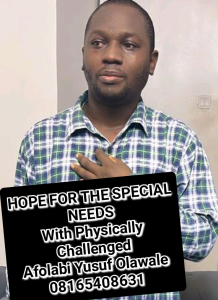
“Let’s strive for a society where every individual, regardless of their disability, feels valued, respected, and empowered to thrive.Whenever you think disability, also think humanity; think Equity.”
Disability, disability, disability. What’s up with this word? I feel like this word is becoming overly scratchy in my ears, more so because it is mostly used to classify certain persons who have challenges making use of one or more body parts, especially when vividly visible to the Public eye.
But have you paused for a moment to cast your thought on the term “Silent Disability?” Heard of it before? Sounds somewhat familiar to you? However the case, this piece is going to explore my thoughts on “Silent Disability,” especially not from the angle of popular major medicine.
The wheelchair is one mobility device that comes to mind when some persons hear the word “disability” or “disabled.” To another set of persons, clutches come to mind when they hear the word. Glasses, guide dogs, or canes to some persons who may be informed symbolise visual challenges. When one sees Speaking hands conversing without vocalising, and the results of such conversation are noticeable from facial expressions, what easily comes to the minds of the informed is hearing/vocal difficulty. Just to mention a few visible popular ones, but not to mention all in this one piece, because the list is unfortunately not endless.
Taking a deeper delve into the word “Disability,” it simply states not having the wherewithal to accomplish something. Hence, assistance or dependence is inevitable if such things must be done. This undoubtedly is our human reality, as, of course, “no man is an island,” making us depend on or need assistance from someone or something, whether directly or indirectly.
Without jibing, think of someone who struggles to control their impulses and acts upon any urges they feel. This could be a person who impulsively takes action before thinking it through. Is it sexual urge? Is it impulsive buying? Is it easy irritation? Is it impulsive eating and drinking? Etc., name it. This kind of person practically gives in to whatever urges they feel. This uncontrol of impulses can be a form of silent disability, as it can limit a person’s ability to function in society and form healthy relationships.
Another example of silent disability is ego. A person with a large ego may be unable to see the perspectives of others or admit their mistakes. This can lead to conflict and isolation. Such person may lose worthy friendships and relationships, as they may be seen as toxic and manipulative.
Additionally, not having enough money to afford necessities can be a form of silent disability. This can lead to stress, anxiety, and depression, which can make it difficult to function in daily life. This form of disability does not only affect a person mentally; it also can push one into unaccepted social vices such as stealing, kidnapping, fraud, prostitution, and the like.
Impatience, as it may be overlooked, is another example of silent disability. An impatient person may have difficulty waiting for things or dealing with delays. This can lead to frustration and anger, which can negatively impact relationships and productivity in everyday life.
Impotence or the inability to achieve or maintain an erection, though, may be argued by some that it is a visible disability, as it involves sexual acts between two persons, for the impotency to be noticed by the other party; so therefore, it is no “silent disability.” But the person who is not sexually active only knows that his impotency is his own silent secret, which, of course, can also be considered a form of “silent disability.” This can lead to feelings of inadequacy and shame, and can negatively impact a person’s self-esteem and relationships.
Inexhaustively, dependence on substances to attain certain emotional states can be a form of silent disability. This can lead to addiction, which can have a devastating impact on a person’s life.
When we think about disability, we often focus on physical disabilities that are visible to others. However, there are many other forms of disability that are not as obvious. These silent disabilities can be just as debilitating as physical disabilities, and they should not be ignored.
When next we talk disability, we should not just streamline it only to the physical shouty ones. We should also consider the silent disabilities that can limit a person’s ability to function in society and live a fulfilling life. By recognizing and addressing these silent disabilities, we can help to create a more inclusive and understanding society.
Having read this, if you think one who is living with a well pronounced shouty disability should be considered more challenged than one living with a silent disability, think again. Both shouty and silent disabilities have their unique struggles and impacts on individuals and society. It’s time to broaden our understanding and empathy.
By acknowledging the diversity of disabilities, we: break stigmas and stereotypes, fostering inclusivity and support to encourage open conversations; promote mental health awareness, and empower individuals to seek help.
Let’s strive for a society where every individual, regardless of their disability, feels valued, respected, and empowered to thrive.
Whenever you think disability, also think humanity; think Equity.
What are your thoughts and comments? Your feedback is well welcome
About The Author








